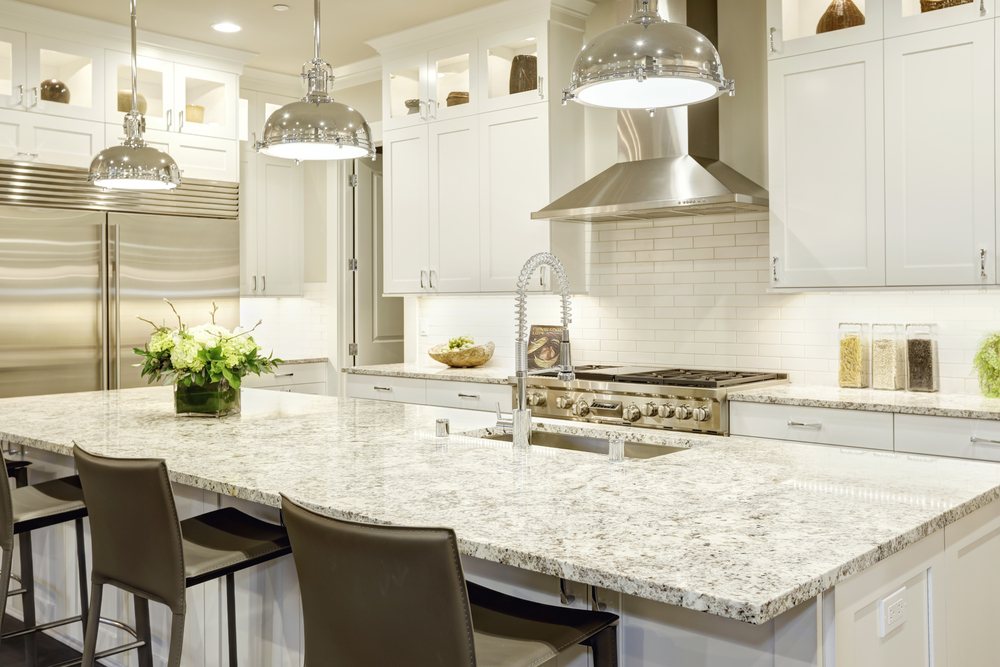
March 27, 2023
How to Clean & Care for Granite Countertops
Granite counters are elegant and luxurious. Granite counters are durable. And, oh my goodness, they are expensive. People who decide on such an investment should know one more quality of granite countertops. Such counters are extremely easy to damage if you use the wrong cleaning products. Simply put, this natural stone is porous and, thus, can absorb what it shouldn’t and easily get stained. Sealing helps solve this issue but creates several dos and don’ts in granite countertop cleaning. In this post, we will break them down and offer some safe and proven ways to clean granite counters to help them retain their beautiful glow for decades to come.
How to safely clean granite counters?
In our previous post, we wrote about cleaning quartz counters, another popular kitchen design option. Taking care of granite is different because it is a naturally porous rock. Unlike artificially manufactured quartz, it doesn’t contain any silicons that would make it unsusceptible to liquids.
New granite counters usually come with a layer of sealant that makes the stone surface liquid-proof and, thus, stain-resistant. However, improper care or years of regular wear and tear erase the sealant. You will know that the sealant is damaged when you notice that it no longer protects the granite from getting stained with food. Resealing must be performed at least once in two-four years. So if you don’t know when the previous resealing was done (for example, you bought this house recently or rent it), it is better to be extra careful with your granite counters until you get them resealed again.
Below, we will tell you how to safely clean the daily mess and stains out of your granite counters without damaging the sealant.
Cleaning granite counters with dish soap and water
Dish soap is the safest and easiest way to remove daily food messes, spills, grease, and light stains from granite counters:
- Clear the counters of all the items (appliances, dishware, and knick-knacks) to prepare the surface for cleaning. Take a dry sponge or cloth and wipe away all the food particles or debris.
- Squeeze some dish soap on a wet sponge (but not on its abrasive side!) to make some foam and scrub the granite surface with it. Areas with stuck, dried food may require some elbow grease, but in most cases, fresh food messes come out effortlessly.
- Rinse and wring the sponge out to wipe away all the foamy mess. Repeat it again and again until the whole counter is clean.
- Dry the surface with a soft, clean cloth to remove the remaining moisture and leave the counters streak-free and shining. This final step is very important! Avoid leaving standing water on granite counters because it can leave water stains.
Fast cleanup and disinfection of granite counters
Sometimes you might not have time for the foam party on your counters. Or your counter isn’t that dirty, and you need only a light instant cleanup plus disinfection. Then this homemade granite cleaner is a perfect option!
How to make your own homemade granite cleaner spray?
Mix water and rubbing alcohol in a spray bottle in a 1:1 ratio. Optionally, you can add some essential oils of your choice to make cleaning a more enjoyable experience. Spray it over the messy area, let it work for one minute, and wipe dry with a clean rag or a microfiber cloth. By the way, this spray makes granite reveal its lustrous gleam, so we recommend using it as a finishing step after the soapy cleaning.
Removing stains and buildup from granite counters
If you missed wiping a spill or two and they stained the granite surface, or you need to get rid of sticky buildup near the cooking area, you can try these methods:
Shave off the buildup with a razor
Using a safety razor blade on a granite surface is okay as long as its entire edge contacts with the surface while you carefully scratch off the buildup. When all the gunk is removed, wipe away the mess with a sponge or microfiber cloth to leave the surface clean and dry.
Remove stains with baking soda
If the granite sealant is damaged, stains become inevitable. For example, you cook a curry sauce and put a spoon you stirred the sauce with on the counter. In a while, you wipe the spill but notice an ugly yellowish stain on its place. Luckily, such stains are not permanent if you address them with baking soda as soon as possible.
If the stain was made by an oily spill (like this curry sauce, for example), make a paste by adding some water to the baking soda. Do not add too much water. Soda must be wet, not runny. For non-greasy stains, mix soda with hydrogen peroxide. Apply the paste onto the stain and scrub it with a clean rag. Wipe away the soda leftovers and tap the surface dry.
Especially sturdy stains may need a few iterations. You can even cover the stain with soda paste on it with plastic film and leave it overnight to do its work. We do not recommend using any other stain removers on granite counters unless it is a commercial stain remover specially developed for granite surfaces.
How to properly take care of granite counters?
- Ensure the sealing is intact
If the sealant has worn off, your number-one priority must be to reseal it as soon as possible. Normally, you should do it every two-four years, depending on how often you cook and, thus, clean the counters. If you notice that they get stained far too fast and water no longer beads up on the surface, it’s high time to reseal the surface. You can ask a professional to do it or buy a commercial DIY sealer.
- Wipe the spills right away
This tip is good for all types of counters — to play safe and make your counters last. After the food mess dries on the surface, it becomes harder to remove and may require more scrubbing. Some spills (based on their chemical PH value) can render granite surfaces dull. Even relatively safe water can leave unsightly water stains that look awful on dark granite. So keeping the counters clean and dry is the best tip.
- Keep acidic and basic cleaners at bay
Chemicals at the extremities of the PH scale (too acidic or too basic) can ruin the sealant properties and cause granite discoloration. Unrecommended cleaners include vinegar, Clorox, bleach, Windex, and other cleaning products containing citric acid, as well as homemade cleaners made of lemon or other citrus fruits. Also, avoid using all-purpose cleaners. By “all-purpose,” manufacturers may mean all kinds of messes, not surfaces.
- Do not cut and use abrasive sponges on granite
Granite is a sturdy material, but its sealant isn’t, so if you do not want to get permanent stains, better not damage the sealant by chopping food on it or cleaning it with steel wood or other abrasive materials. Use the soft side of a sponge, a microfiber cloth, or a soft rag for cleaning.
Granite counters are easy to clean and maintain if you know the strong and weak points of this material. Dish soap and alcohol-based spray are usually enough to keep your gorgeous stone counters clean and shiny. However, if you want more professional care, consider buying a commercial granite cleaner and a sealing product with good reviews to give your counters the most reliable protection. For further help with your home or kitchen cleaning, contact the professional Manhattan-based cleaners at White Glove Cleaner.
